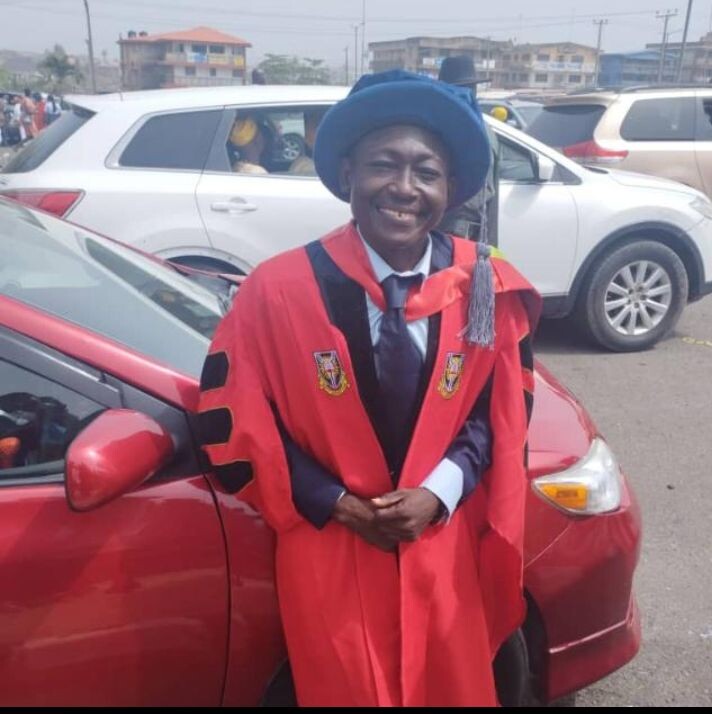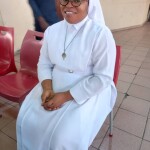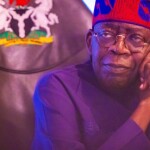Nigeria’s ivory towers seem to have a threshold deaf scholars won’t try to defy. Except by luck.
By Elijah Olusegun
When serendipity pops up, Mohammed Adelekan sees it. Discerning its sound, though, is a different ball game. The train of events in his life in the last 24 years confirms the charmed life he lives. Starting his master’s degree immediately at the University of Ibadan (UI) after he lost his hearing; snagging a job at the Ogun State Teaching Service Commission; a nudge to study special-need education; running into a fellow that pointed him in the right direction at UI, eventually becoming his colleague at the special education department in Lagos State University (LASU).
“Not many persons with hearing impairments have been this lucky,” he told ER, through his interpreter and colleague Friday Azarno, on March 5 at the varsity’s Faculty of Education. The institution has no sign language interpreter. The Lagos State Special People Law, in section 7, though, insists schools at all levels should include in their curricula: (a) learning of Braille; (b) sign language; (c) augmentative and alternative communication skills; (d) peer support and; (e) mentoring.
Adelekan wasn’t complaining. “I am grateful to LASU,” he said, over and again.
His colleagues within and outside the deaf cluster of the Joint National Association of Persons With Disabilities (JONAPWD) aren’t necessarily fated to ill luck. (There are no fewer than nine million of them, as Julius Shemang of the African Deaf Initiative put the figure in 2021.) The enactment of the Prohibition Act in 2018 guaranteed a level playing field for the deaf and all PWDs; it also changed the narrative for Adelekan as a person, eight years after he lost his hearing.
According to Sections 1 of the Act: A person with disability shall not be discriminated against on the ground of his disability by any person or institution in any manner or circumstances.
The reality, however, is different in Nigeria’s ivory towers. There is a glass ceiling, apparently, for the PWDs in the teaching profession at the tertiary level. And it’s somewhat more impregnable for a gatecrasher like Adelekan and others who come in from fields other than special education.
He fell sick about the time to finish his master’s degree at the University of Ibadan in 2000, following his first degree in biology from the Olabisi Onabanjo University. “Luckily I had good results, and got the opportunity to start my master’s in agriculture/forestry /biology at the University of Ibadan,” he said. By the time he completed the programme, his hearing had gone completely. He’d later realize the height of the hurdle in the path to his PhD. “My lecturer told me, ‘How do you expect me to supervise you?’” There was no Prohibition Act then. Many PWDs might have got their lives stagnated this way, in the thick of discrimination.
Adelekan explained how society or even a deaf person reacts to debilitating misfortunes, especially deafness. Those he described as of the audiological perspective believe deafness is a disease—a medical problem curable with cochlea implants, drugs, and bugs. “He wears his hearing aid, uses his speech instead of the sign language, and has no interest in the deaf community,” he said. But some deaf persons, like him, take the socio-cultural view, and accept the sign language as their only means of communication. “We’re deaf and we’re deaf. It makes us no less than a human. We take it as diversity, and we identify as a socio-cultural group.” His ableist lecturer, he believed, might have been ignorant of what the sign language could do for their teacher-supervisor relationship then.
But luck smiled on Adelekan again. He got a job with the Ogun State Teaching Commission. And life as a deaf teacher continued.
Self-actualization soon kicked in here when he saw her colleague with the NCE in special education earning more than he. “She told me they were the real teachers—not me with my just a masters,” he said. He decided to study special education for his PhD.
“It was then I met my friend Azarno. He was an officer in the department of special education at UI then.” He counselled Adelekan to ditch the PhD idea, and consider another master’s degree in special education. That meant a surer path in the field.
The two had their second degree, and buddied up since then—till they both completed their PhDs.
Dr. Azarno is not the only person Adelekan knows. There are others, all deaf: one read engineering; one, medicine; another, law. There is also one deaf colleague of his lecturing—at the Special College of Education in Oyo. But he can’t remember ever meeting or reading about a scholar like him lecturing in other faculties apart from education in Nigeria. Nor anyone of them lecturing without studying special education, even if they flaunt PhDs in their fields, and sizzle with abilities. The carte blanche the Prohibition Act 2018 gives them—to aspire to anything in life—counts for little.
It’s not like the policy against discrimination fails at this point, another lecturer in the LASU department said. PWDs can become anything they want—that is those motivated enough to try, though most aren’t. He can’t figure how a deaf person can teach law or engineering in an inclusive class. “It’s only a privilege which a few of them have to lecture in special education departments,” he said. He admitted, however, the deaf can realize such ambition where the needed technology is available. Most of Nigeria’s disability laws provide for the technical aspects. So not much is wanting in those laws. Their implementation remains the problem.
The three agreed not many state universities provide such necessary technical facilities: like screens with closed captions befitting an inclusive lecture theatres. Federal universities are no exemption. A deaf medical doctor, Ijeoma Nnodom, once shared with ER how she lip-read her way through the University of Lagos years ago. There might be some equipment, no doubt, for the schools’ special education departments.
With his two master’s degrees and a PhD, Adelekan himself cannot aspire to teach what he wants: forestry and wild life, his first love.
But what more can he ask for? “The Lagos government is even trying more than any state implementing the disability law; it’s putting so much into making education inclusive,” he said.
He couldn’t have said it better.
There he was before, chalking and talking for more than a decade in an Ogun secondary. Another opportunity for change came knocking when LASU started its special education programme last year. He and Azarno applied. They both made the cut.
Now, ever so grateful, Adeleke teaches what he needs to: Introduction to Special Education.







